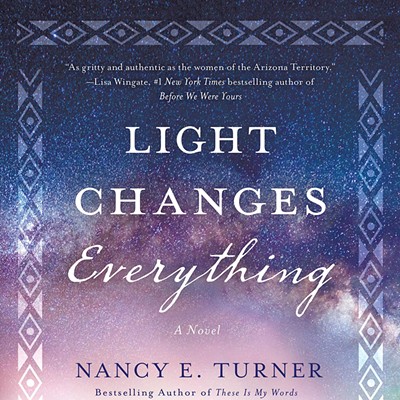When the central character in Laura Fitzgerald's debut novel dons new high-heeled boots and sets off on foot from El Encanto for the downtown library, you know that child has blisters by the time she's hit the UA mall and will need to stop somewhere like the Main Gate Starbucks for relief.
That the cute coffee guy she meets there is named "Ike" (a nod to local java-meister?), and that the El Encanto "plantation style" house she's staying in sounds a lot like your daughter's friend's parents' home, could make you imagine you're privy to inside dope.
The "inside dope" Fitzgerald is really dishing, however, has little to do with visualizing the Broadway bus route or Himmel Park. Central to Fitzgerald's warm little romance, Veil of Roses, is the issue of oppression in Iran--especially that of women. And most of us here haven't had much experience with that.
Fitzgerald, who divides her time between Wisconsin and Tucson, is not Iranian, but she's married to an Iranian American. When they were children, her husband and his siblings were sent to the U.S. by parents who remained behind during the revolution. That's a reality that resonates in her novel.
Veil of Roses opens in Tucson with little girls on a playground sparking a flashback to the birthday celebration of 27-year-old Tamila Soroush in Tehran. She has quit her teaching job, and has retreated--in depression--to her parents' house, to await the inevitable next step in her life: arranged marriage. But, rather than a family confab to set her up with a friend's son, what her parents present her for her birthday is a reprieve: a one-way ticket to her sister in Tucson, a passport and three months to find an Iranian-American husband so she can escape the mullahs.
Unworldly Tami is quite unprepared for the wide-open freedoms of the West, and she manages to complicate her hunt for a suitable life mate by dallying with the blue-eyed Starbucks barista. Clashing cultural expectations, behavioral idiocyncracies and personal agendas all catalyze action around her.
Fitzgerald sets Tami down among an interesting collection of folks. Her older sister, 15 years in the country, comfortably married to an orthopedic surgeon, excels at cosmetics (surgical and applied), clothes and control. Determined to secure Tami a green card, she won't let as petty an issue as a suitor's mental instability discourage her from making wedding plans.
Fitzgerald gets double duty out of a social situation Tami enters, her English language class. First, Tami develops friendships (Eastern and Western Europeans; a Latino); second, since some have experienced repression in their home countries, Fitzgerald can further her themes about the natures of freedom, sex, marriage and women's rights.
It's a challenge to a writer to create a first-person narrator who's bright but naïve, but Fitzgerald pulls it off pretty well. Tami changes as she acclimates. Fitzgerald lets non-threatening characters introduce new concepts to Tamila. (A chatty airplane seatmate alludes to "things" her Persian boyfriend "could do with his tongue"; slightly skanky Eva, a German who becomes Tamila's best friend in Tucson, takes it upon herself to educate her in areas ranging from line--and pole--dancing to Internet dating and the finer points of flirting on the street.) She successfully creates a new immigrant's moment with a cultural misunderstanding over a free sample of tea. Tamila tries--in good Iranian tradition--to pay for it three times. Two police officers stopping for coffee serve to both teach Tamila that U.S. cops can be friendly, and inform readers about the heavy-handed tactics of religious law enforcers in Iran.
While some of her cultural information is neatly embedded in character or action, sometimes Fitzgerald resorts to straight exposition.
Veil of Roses is sweet but not treacly. On her Web site, Fitzgerald writes that whenever she saw a cross-cultural film like Bend it Like Beckham or My Big Fat Greek Wedding, she would tell her husband that somebody should write one about the Iranian-American experience. And she's done it ... in clean, unadorned prose; with a dusting of sympathetic humor; and with a feel-good ending.
And it grows difficult to put down. Admittedly, when this reader should have been grocery shopping rather than reading, she finished the book in the parking lot of the very midtown Wild Oats where Tamila picks up tortillas.
It's not far from Ike's.
Where one could imagine Fitzgerald word-processing away on her next novel.








